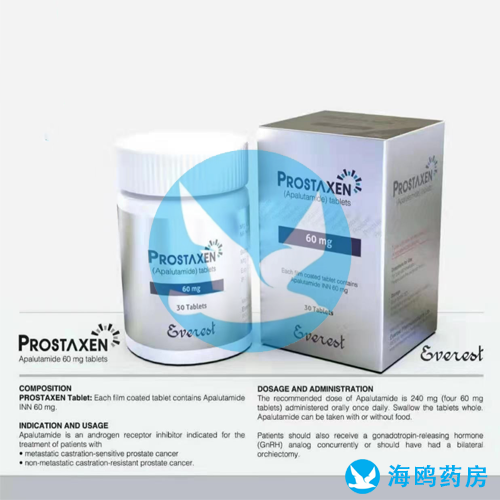Apalutamide Combo Improves Radiographic PFS in mCRPC
Patients with metastatic castration-resistant prostate cancer experienced an improved radiographic progression-free survival (PFS) following treatment with apalutamide plus abiraterone acetate (Yonsa) and prednisone compared with an active and established comparator arm, according to the results of a phase 3 trial (NCT02257736) published in The Lancet Oncology.

The median PFS was 22.6 months (95% CI, 19.4-27.4) in the apalutamide group vs 16.6 months (95% CI, 13.9-19.3) in the placebo group (HR, 0.69; 95% CI, 0.58-0.83; P <.0001). The updated analysis, after a median follow up of 54.8 months, investigators reported a median PFS of 24 months (95% CI, 19.7-27.5) in the apalutamide group compared with 16.6 months (95% CI, 13.9-19.3) in the placebo group (HR, 0.70; 95% CI, 0.60-0.83; P <.0001).
A total of 982 patients were randomized to either the apalutamide group (n = 492) or the placebo group (n = 490). Treatment discontinuation occurred in 441 patients in the apalutamide group and 449 in the placebo, with 49 and 44 patients in each respective group still receiving treatment at the time of data cutoff.
Patients were given 240 mg of apalutamide once daily, which was administered as four 60 mg tablets; 1000 mg of abiraterone each day, split into four 250 mg tablets; and 10 mg of prednisone which was administered as a 5 mg tablet twice a day for 28-day treatment cycles. Patients in the control arm received placebo as 4 tablets with the same abiraterone and prednisone backbone.
A total of 353 patients were at least 75 years old, and 829 had bone metastases. Additionally, 143 patients reportedly had visceral disease upon enrollment.
At a median follow-up of 25.7 months and 54.8 months, 484 and 587 radiographic PFS events by investigator review and independent review occurred, respectively. In the post-hoc analysis, the interaction between age and treatment effect were reported to be significant (P = .020), although the interaction between visceral disease and treatment effect was not (P = .83). The median PFS by blinded independent central review was 22.0 months (95% CI, 19.2-24.0) in the apalutamide group and 19.2 months (95% CI, 16.5-22.1) in the placebo group (HR, 0.86; 95% CI, 0.72-1.04). The median overall survival was 36.2 months (95% CI, 32.8-38.8) in the apalutamide group and 33.7 months (95% CI, 31.2-38.3) in the placebo group (HR, 0.95; 95% CI, 0.81-1.11; P = .50).
A significantly higher proportion of patients in the apalutamide cohort had a confirmed decline in prostate specific antigen (PSA) level of at least 50% and achieved undetectable PSA concentrated during treatment vs those in the placebo group. Investigators did not find significant differences in median time to PSA and overall response rates between cohorts.
Additionally, apalutamide did not worsen patient’s health-related quality of life compared with the placebo group based on results from the Functional Assessment of Cancer Therapy–Prostate (FACT-P) assessment form. Patients reached the FACT-P total score at a median of 12.9 months (95% CI, 9.0-15.7) in the apalutamide group and 15.7 months (95% CI, 12.8-18.4) in the placebo group (HR, 1.16; 95% CI, 0.94-1.42; P = .16).
Serious treatment-emergent adverse effects (TEAEs) occurred in 195 patients in the apalutamide group and 181 patients in the placebo group. Grade 3/4 TEAEs occurred in 60% of patients in the apalutamide group and in 51% of those in the placebo group. Grade 3/4 hypertension commonly occurred in both the apalutamide (17%) and placebo (10%) cohorts.
Cardiac disorders were reported in both groups (19% vs 19%), with 6 patients dying in the apalutamide group and 13 in the placebo. Grade 3/4 (TEAEs) leading to discontinuation occurred in 46 patients in the apalutamide group and 31 in the placebo group, with 17 and 37 patients dying from TEAEs in both groups, respectively. Drug-related TEAEs which led to death occurred in 3 patients in the apalutamide group—pulmonary embolism and cardiac failure—compared with 5 in the placebo group—cardiac arrest, cardiac failure, mesenteric arterial occlusion, seizure, and sudden death.
Reference
https://www.cancernetwork.com/view/apalutamide-combo-improves-radiographic-pfs-in-mcrpc
Disclaimer:《Apalutamide Combo Improves Radiographic PFS in mCRPC》Edited and sorted by Seagull Pharmacy's editors. Please contact us in time if there is any infringement. In addition, the suggestions for drug usage, dosage and disease mentioned in the article are only for medical staff's reference, and can not be used as any basis for medication!